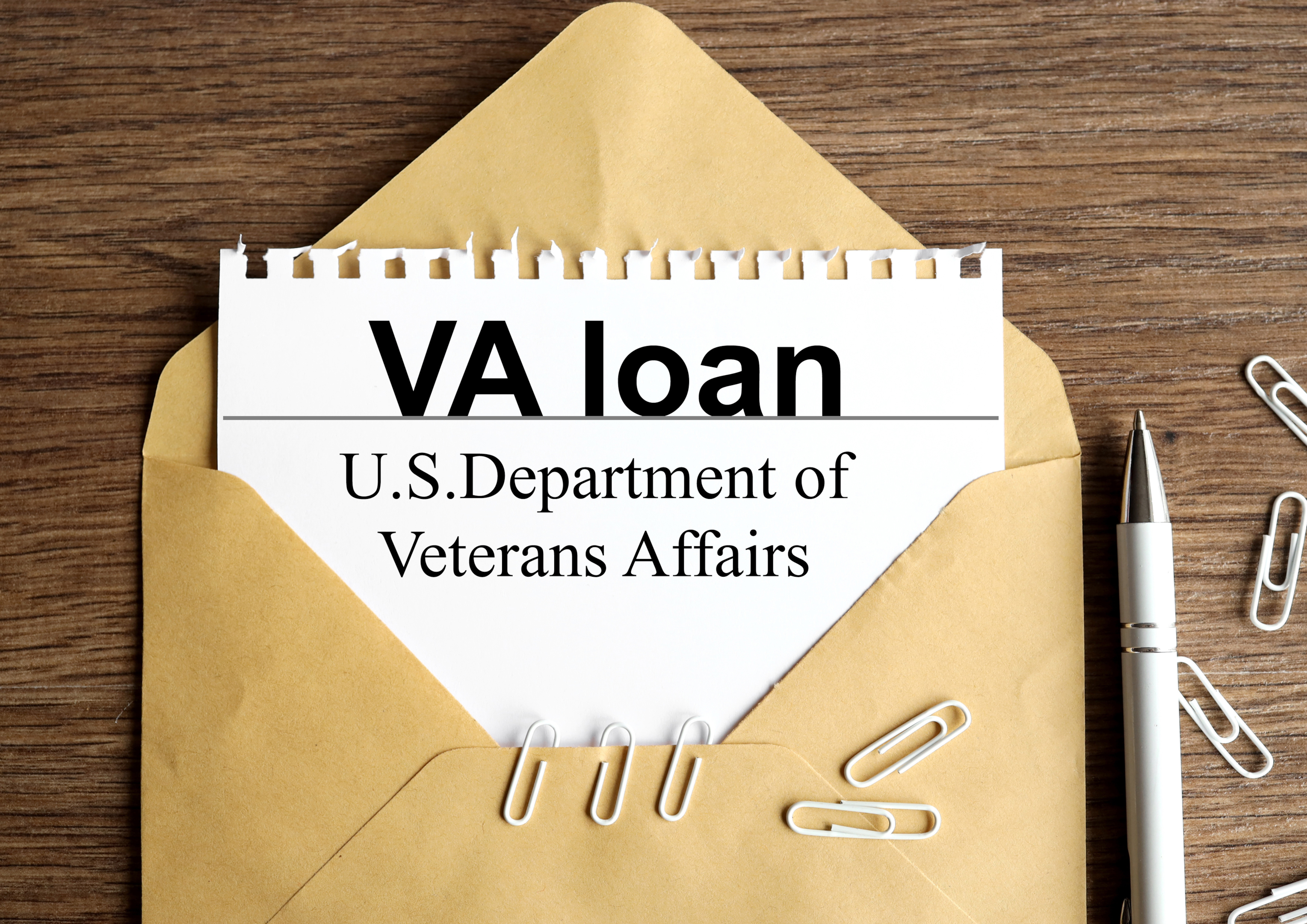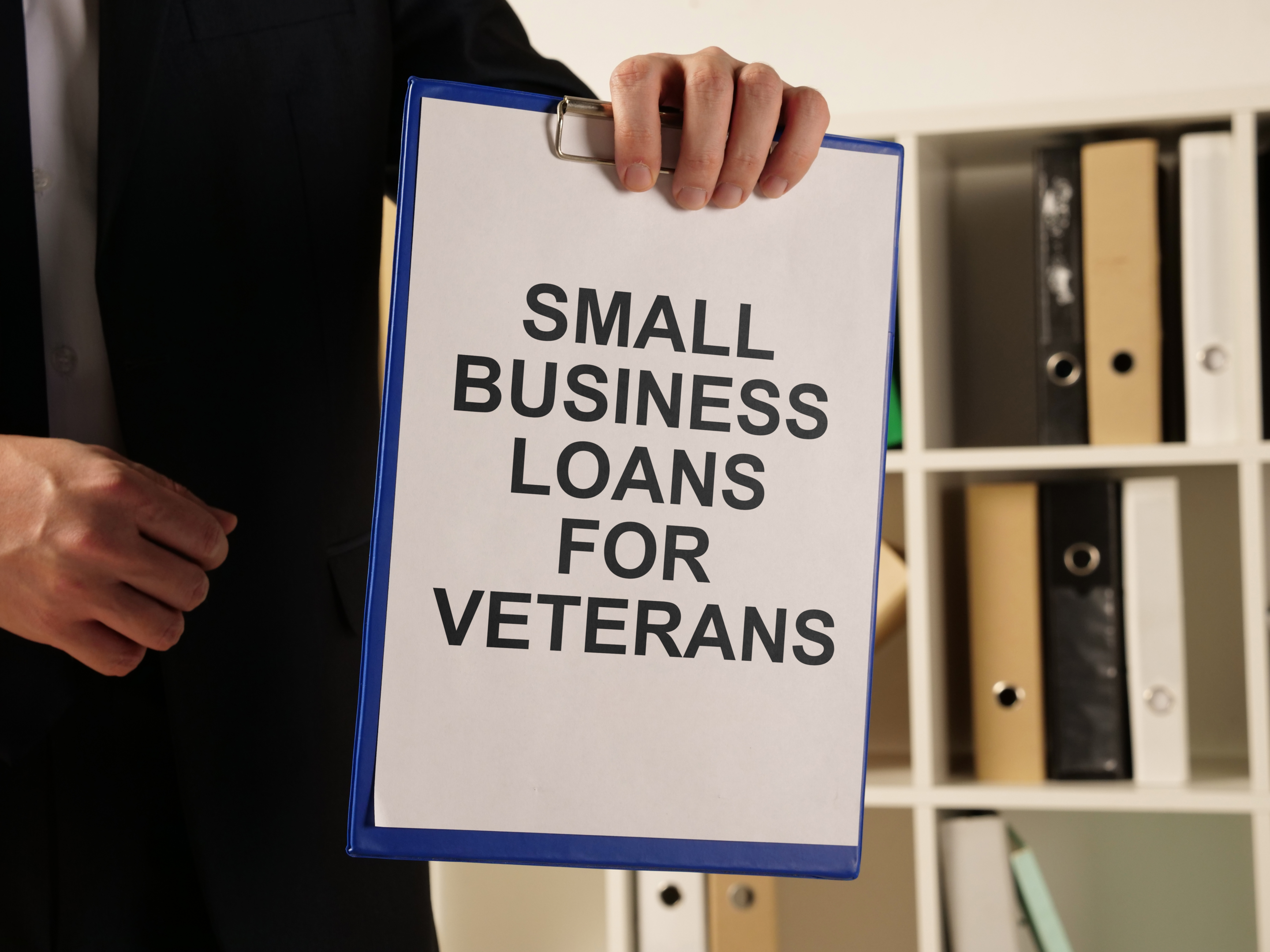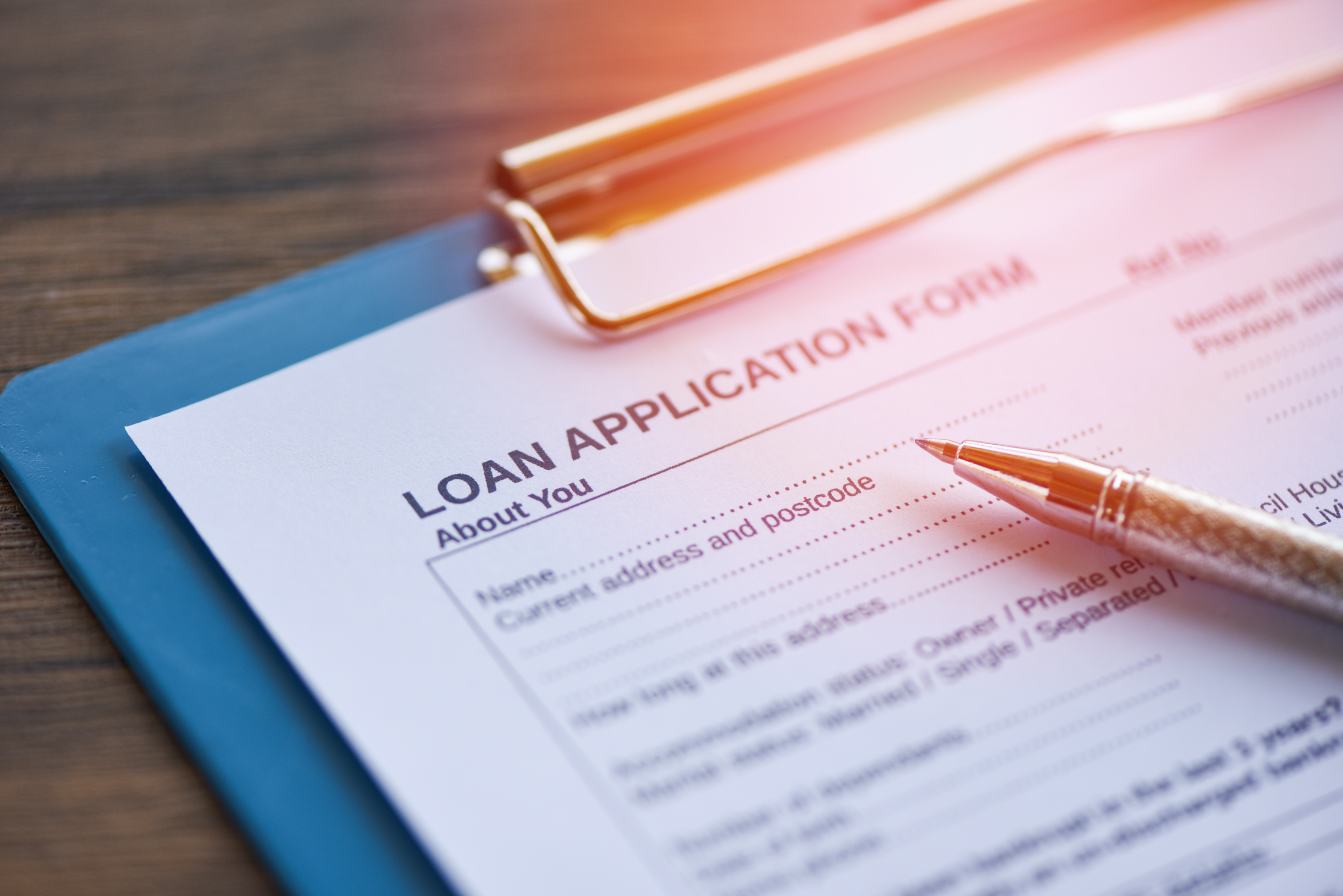According to the Small Business Association, veteran-owned businesses make up 9.1 percent of all US businesses — and they all need capital to get and keep them going. But securing financing for a startup or a small business is almost never easy. And it can be even more difficult for veterans, who may have gaps in their financial history due to time on active duty.
Luckily, there are a few options for business loans for veterans. Some are government-funded, while others come from the private sector. Let's take a look first at government-funded small business loans for veterans and then dive into the private sector.

Government-funded business loans for veterans
The Small Business Association (SBA) administers the most well-known small business loans for veterans: the Veterans Advantage program — which includes the 7(a) Loan and the Express Loan — as well as Military Reservist Economic Injury Disaster (MREIDL) loans.
1. SBA's Veterans Advantage loans
The SBA's Veteran's Advantage Loan program applies to loans for up to $350,000. The program applies to two SBA loans: SBA Express and SBA 7(a) loans.
Who is eligible for a Veterans Advantage loan?
In order to be eligible for a Veterans Advantage Loan, small businesses and startups must meet the following requirements:
Be owned and controlled (51% or greater) by a veteran.
Veterans must be: honorably discharged or service-disabled.
OR active-duty military service member eligible for the Transition Assistance Program(TAP)
OR active reservists and/or National Guardmembers
OR a current spouse of any veteran, active duty service member, reservist, National Guard member, or the widowed spouse of a service member who died while in service or as a result of a service-connected disability.
2. SBA 7(a) Loan
While the SBA 7(a) Loan Program is not a dedicated veteran business loan, as it is for both veterans and non-veterans, there are some special perks for vets under the Veterans Advantage program.
For loans up to $125,000, vets can get upfront guaranty fees of zero. For loans greater than $125,000, vets are promised a 50 percent reduction of guaranty fees. Loans can be for up to $350,000.
Requirements for a 7(a) Loan Program SBA small business loan
The 7(a) Loan Program is the most popular SBA small business loan. 7(a) Loan Program SBA small business loans can be used for purchasing fixed assets, and working capital, financing startups, purchasing an existing business, and for debt repayment.
In order to qualify, a company must first meet the Small Business Administration size standards. Because SBA loans are specifically for small businesses, they've created a “size standards tool” that helps founders and small business owners determine whether or not they qualify.
Once you've determined whether or not your company qualifies under the size standards, here is a checklist of the remaining requirements for qualifying for a 7(a) Loan Program SBA small business loan:
For-profit: Your business or startup must be for-profit.
Location: Your business or startup operates within the United States.
Repayment ability: You have to be able to prove that you have the ability to pay back the loan.
Management ability: You have to prove that you can successfully manage this business. Startups specifically must show that founders have experience in the field that they're proposing to start a business in and also that they have “significant” management work experience.
Equity: For new businesses, founders must have approximately one dollar of cash or business assets for every three dollars of the new loan. For established businesses, owners must have no more than four dollars of total debt for each dollar of net worth.
Who is ineligible for a 7(a) Loan Program SBA small business loan?
While most small businesses will qualify for a 7(a) Loan Program SBA small business loan, there are some characteristics that make a small business or startup ineligible.
You don't meet the SBA size standards for a small business.
You have access to funds in other ways, such as in your own wealth or you would qualify for a loan without the SBA guarantee backing your startup.
You need the loan to pay off inadequately secured creditors.
Your startup is for speculation, lending, investment, or rental real estate.
Your startup is a non-profit.
Advantages of a 7(a) Loan Program SBA small business loan:
The equity requirement is relatively low. A 7(a) Loan Program SBA small business loan requires 10 percent borrower equity, compared to as much as 30 percent for a traditional loan.
The loan is backed by the federal government. That means banks are more likely to loan to riskier companies — like startups — than they might otherwise.
7(a) Loan Program SBA small business loans are available to groups that may not have access to traditional finance, including export businesses, underserved communities, military, and small business owners who need help meeting short-term and cyclical working capital needs.
SBA loans have a floating interest rate that's tied to the Prime Rate. The maximum interest rate for these loans is Prime Rate plus 2.25 percent for loans maturing in 10 years or less, and Prime Rate plus 2.75 percent for loans maturing in 25 years.
Disadvantages of a 7(a) Loan Program SBA small business loan:
7(a) Loan Program SBA small business loans are relatively small. They have an upper limit of $5 million.
These loans may require more paperwork than a traditional loan.
Startups or founders with poor credit are unlike to qualify.

3. SBA Express
The SBA Express loan is basically a 7(a) loan, but with a faster turnaround time. Applicants can expect to hear back from the SBA within 72 hours of applying.
Under the Veteran's Advantage program, all upfront loan guaranty fee are waived on loans between $150,001 and $350,000.
Advantages of an SBA Express loan
All of the advantages of a regular 7(a) loan, PLUS
Very fast turnaround — decision within 72 hours of applying
Disadvantages of an SBA Express Loan
All of the disadvantages of a regular 7(a) loan, PLUS
The SBA guarantees only 50 percent of Express loans
4. Military Reservist Economic Injury Disaster (MREIDL) loans
Military Reservist Economic Injury Disaster (MREIDL) loans are for small businesses and startups whose owner — or an “essential employee” — is called up for military service.
The goal of these loans is to provide working capital to those businesses in order to help them stay alive while the service member is gone. This loan is not to replace lost profits but to pay obligations and replace working capital.
These loans have an interest rate of 4 percent, loan terms with a maximum of 30 years, and a loan amount limit of $2 million.
Requirements for a Military Reservist Economic Injury Disaster (MREIDL) loan
Once you've determined whether or not your company qualifies under the SBA size standards, here is a checklist of the remaining requirements for qualifying for a Military Reservist Economic Injury Disaster (MREIDL) loan:
The SBA will determine whether credit in an amount needed to accomplish full recovery is available from non-government sources, without creating an undue financial hardship to the applicant.
That means if you can get the money somewhere else without it being too much of a hit, you won't qualify. However, 90 percent of businesses that apply for this loan meet this requirement.
Collateral is required for loans over $50,000. However, the SBA will not decline loans for lack of collateral.

Private small business loans for veterans
1. StreetShares
StreetShares is an online, peer-to-peer lender that was started by veterans, for veterans. They offer both business loans between $2,000 and $100,000 and lines of credit between $5,000 and $100,000.
Once you apply, funders will compete to fund your business. Take some time crafting your personal story in order to have an advantage at that stage.
The APR range is 8.00 percent to 39.99 percent and if you have excellent credit, you may qualify for a single-digit APR.
Loan terms are three to 36 months and payments are weekly.
Who is eligible for a StreetShares loan or line of credit?
Veteran small business owners.
Businesses that make at least $25,000 annually.
Businesses that are at least one year old, for loans, or two years old, for credit.
Incorporated businesses.
Founders/owners who are US citizens or permanent residents.
Founders/owners with a personal credit score of at least 600.
Founders/owners who can personally guarantee a loan or if they own less than
25 percent of the business, can bring on other guarantors.
Who is ineligible for a StreetShares loan or line of credit?
Businesses in Oregon, North Dakota, and South Dakota.
Founders/owners with credit lower than 600.
Businesses in agriculture, real estate, law, or tax preparation firms not owned by CPAs.
Advantages of a StreetShares loan
Quick turnaround. You'll hear within one to two days if offers have been made on your loan.
Potential for very low interest, if you have excellent credit.
StreetShares is for veterans, by veterans, which means they may understand your particular needs.
Disadvantages of a StreetShares loan
Loan terms are relatively short — three to 36 months — and weekly payments can be difficult for some founders.
How to apply for a StreetShares loan
StreetShares is an online lender, so their application is fairly simple and completely online. You'll need:
Your loan amount and terms.
Basic business information: annual revenue, years in operation, number of full-time employees, and legal entity type.
Other business documents, based on the loan.
Social Security Number (SSN)
Employer Identification Number (EIN)
Total outstanding business debts
Six months of business and personal bank statements
Most recent business and personal tax returns
An optional pitch describing your business and how you plan to use the funds.
2. Hivers and Strivers
While not technically loans, we decided to include venture capital and angel investment firms in this roundup because they're a unique opportunity for military and veteran startup founders to access funding.
Hivers and Strivers is an angel investment group that invests in early-stage startups founded and run by graduates of the U.S. Military Academies.
Their investors are military service people who are generally senior executives in a range of industries. They believe that young military graduates are an excellent investment and that they will “provide superior returns.”
Their typical investment is $250,000 to $1 million and they are willing to partner with other investors if startups are seeking more funds than that.
They also commit to active involvement, advisory and board roles, and mentorship in order to ensure the success of their investment companies.

Veteran entrepreneurship training programs
There are also several veteran entrepreneurship training programs, many — but not all — of which are run by the SBA.
1. Service-Disabled Entrepreneurship Development Training Program
The Service-Disabled Entrepreneurship Development Training Program is a training grant available for up to six grant awardees with a minimum award of $50,000 and a maximum award of $150,00.
Its purpose is to support organizations that currently deliver entrepreneurship training program(s) to service-disabled veteran entrepreneurs who want to become small business owners or who currently own a small business.
2. Veterans Institute for Procurement (VIP)
Veterans Institute for Procurement (VIP) is an accelerator program with three training programs: VIP GROW, VIP START, and VIP INTERNATIONAL.
VIP GROW assists companies in developing strategies to expand and operate within the federal marketplace.
VIP START is for companies wanting to enter the federal market and become procurement-ready.
VIP INTERNATIONAL is for companies that want to enter or expand their federal and commercial contracting opportunities overseas.
All three programs are in-residence training programs for owners, principals, and C‐level executives of veteran-owned small businesses and service-disabled veteran-owned small businesses.
The programs consist of a 27‐hour, 3‐day comprehensive certification program and covers over 20 topics, including contracting, teaming agreements, human resources, accounting, finance, program controls, and business development.
It takes place in Washington, DC, four times per year and is offered at no charge to qualifying businesses.
3. Boots to Business
Boots to Business is the two-step program offered by the SBA on military installations around the world as a training track of the Department of Defense's (DODs) Transition Assistance Program (TAP).
The Introduction to Entrepreneurship course is also available 24/7 through DOD's Joint Knowledge Online. Upon completion, service members can continue training via an eight-week online Foundations of Entrepreneurship course.
Boots to Business Reboot extends the entrepreneurship training offered in TAP on military installations to veterans of all eras.
4. Veteran Women Igniting the Spirit of Entrepreneurship (V-WISE)
Veteran Women Igniting the Spirit of Entrepreneurship (V-WISE) is an SBA-funded program provided by the Institute for Veterans and Military Families.
V-WISE includes online training, a conference, and mentorship to female veterans.
5. VetsInTech
VetsInTech is a private sector training program that connects current and returning veterans with reintegration services and also with the tech ecosystem.
They offer tech-related education opportunities, connections with tech jobs, and workshops and boot camps to help veteran startup founders boost their businesses.

Here are 7 small business loans for Veterans
Veteran business owners deserve to have as much support as possible. Many companies offer small business loans for veterans, but searching for them is a task of its own. Traditional financial institutions don't always support VA business loans, especially if you have bad credit. Small business owners ready to apply for a veteran business loan, here is a list we've collected to assist you in your journey.
SBA Express loan
Best for SBA loans for veterans — Max loan amount: $500,000. Minimum credit score: 650.
PNC Bank - Line of credit
Best for Veterans with established businesses — Max loan amount: $100,000. Minimum credit score: 720.
Credibility Capital - Online term loan
Best for Veterans with established businesses — Max loan amount: $500,000. Minimum credit score: 650.
OnDeck - Online term loan
Best for Fast small business loans for veterans — Max loan amount: $250,000. Minimum credit score: 600.
Bluevine - Line of credit
Best for Fast small business loans for veterans — Max loan amount: $250,000. Minimum credit score: 625.
SBA Microloan
Best for Startup business loans for veterans — Max loan amount: $50,000. Minimum credit score: 620.
Fundbox - Line of credit
Best for Startup business loans for veterans — Max loan amount: $150,000. Minimum credit score: 600.

Other financing options:
If you're interested in learning about other financing options that aren't veteran-specific, check out our following guides:
Stay tuned for future guides!
Quick Wrap Up
There are many different options for veteran owned businesses in need of someone financial support without maxing out any business credit cards in the process. Business loans can be a helpful option — but make sure to do your research and understand the fine print before making any commitments.
Find this article helpful?
This is just a small sample! Register to unlock our in-depth courses, hundreds of video courses, and a library of playbooks and articles to grow your startup fast. Let us Let us show you!
Submission confirms agreement to our Terms of Service and Privacy Policy.
Already a member? Login
No comments yet.
Start a Membership to join the discussion.
Already a member? Login